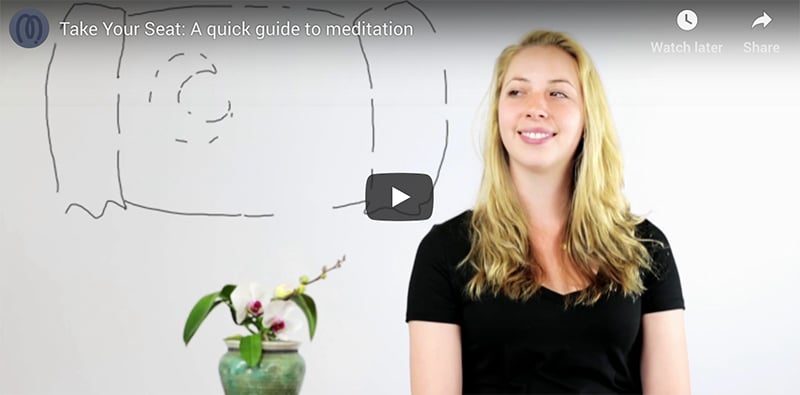Mindfulness Meditation Training Techniques for Beginners
Category: Beginners Guide to Meditation | Popular

According to the Eastern meditative traditions, lasting happiness is achieved by understanding and training the mind. Our usual pattern is to look to the outside world for the validation and comfort that define our happiness, but we can’t control all of the events in our lives. Some events make us feel happy, others make us miserable. Some cause well-being, others cause stress.
Generally, events and situations govern how we feel. Meditation teaches us that even when there are ups and downs in our lives, we can use mindfulness and awareness practice to deepen our understanding and develop the positive, enduring qualities that lead to stable happiness. What’s more, we also find that this personal well-being naturally has a ripple effect that benefits others as well.
Mindfulness for beginners
Ever wonder why mindfulness is so popular? It seems like new mindfulness-based practices and therapies crop up every day. From the famed mindfulness-based stress reduction course to mindful eating, mindfulness-based dementia care, mindfulness-based relapse prevention and much more, mindfulness has found its way into virtually every form of wellness therapy.
But is mindfulness a therapy in and of itself? Actually, mindfulness is first and foremost a method that stabilizes and relaxes the mind by encouraging it to pay full, non-judgmental attention to the present moment. Mindfulness is simply the process of becoming aware of our thoughts and feelings in the current moment.
A practice that can be incorporated into your daily schedule and cultivated gradually, mindfulness is the opposite of what most of us do most of the time: obsess over past or future events, worry about to-do lists, stress about life and seek constant reassurances from others. When we practice mindfulness meditation, we train the mind to remain rooted in the present. We do this by focusing our attention on an object – often the process of breathing – for some minutes. By turning our attention inwards and training the mind to settle, we find that our ability to remain composed and peaceful even when life presents us with curve balls increases greatly and our attitudes about life are transformed. As the great American psychologist and philosopher William James put it over a century ago, “The greatest discovery of my generation is that a human being can alter his life by altering his attitudes of mind.”
Mindfulness meditation training techniques
What does mindfulness for beginners look like? An excellent resource that will give you everything you need to get your practice going is the Mindworks Journey to Well-Being, presented in clear and accessible modules that only require a few minutes of commitment per day.
Another great way to familiarize yourself with the nuts and bolts of meditation is to join a local class or group. It’s always helpful to have practice buddies you can ask questions of and who will inspire you to keep on with your practice.
Meanwhile, here are a few pointers or meditation tips for beginners:
- Set aside some time
The first step is to set aside a few minutes each day to practice mindfulness. You don’t necessarily have to have a dedicated meditation chair or cushion to get going. And there are no “special skills” required. Just 10 to 15 minutes daily is enough to get you started. Think about what time of day will be best for you; a lot of people like to sit in the morning before the busy-ness begins, but some prefer evenings or after work.
- Find your seat
The most important thing about your posture is finding a way to sit comfortably with your back straight, whether you’re on a chair, cushion or meditation bench. Your body should be dignified, aligned and relaxed.
- Tune in to your body and breath
Set aside your busy thinking mind and tune in to the feeling of being present. Remain anchored in the present by paying attention to physical sensations, especially the sensation of breathing. When you inhale, try to be aware of inhaling. When you exhale, try to be aware that you’re exhaling. Don’t analyze or embellish, just impartially observe what’s going on with your body and respiration in the here and now.
- Notice your thoughts and let them pass
As you pay attention to the process of breathing, thoughts and emotions will arise in the mindstream. Big change: you’re not going to react to them! You’re not going to do anything about them one way or the other! You’re simply and mindfully going to acknowledge them, let them pass and go back to your breath. The act of noticing, letting go, and coming back IS mindfulness. It’s that simple.
- Be kind to yourself
Each time you notice that you’ve been distracted is an opportunity to come back to the sensation of breathing. It’s easy to feel frustrated when thoughts and emotions interrupt what was meant to be a “tranquil” meditation session. Don’t lose heart – the tranquility of mindfulness comes from the ability to distance yourself from thoughts rather than the ability to suppress them. Every meditator we know has experienced agitated “monkey mind,” drowsiness and frustration. And every meditator we know thanks their lucky stars they stuck it out. Be kind to yourself by seizing this opportunity to discover everything that meditation has to offer you. Enjoy the journey!
Learn about the best way to Take Your Seat in meditation by watching the video below.







